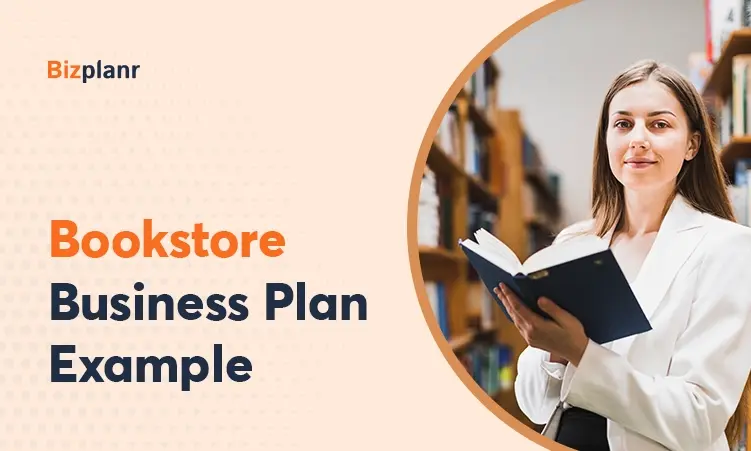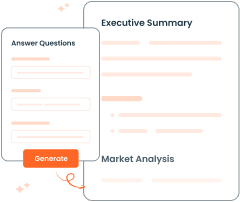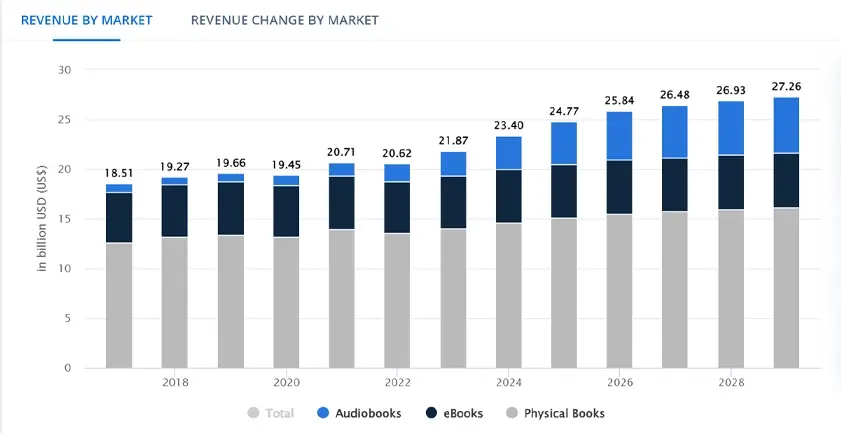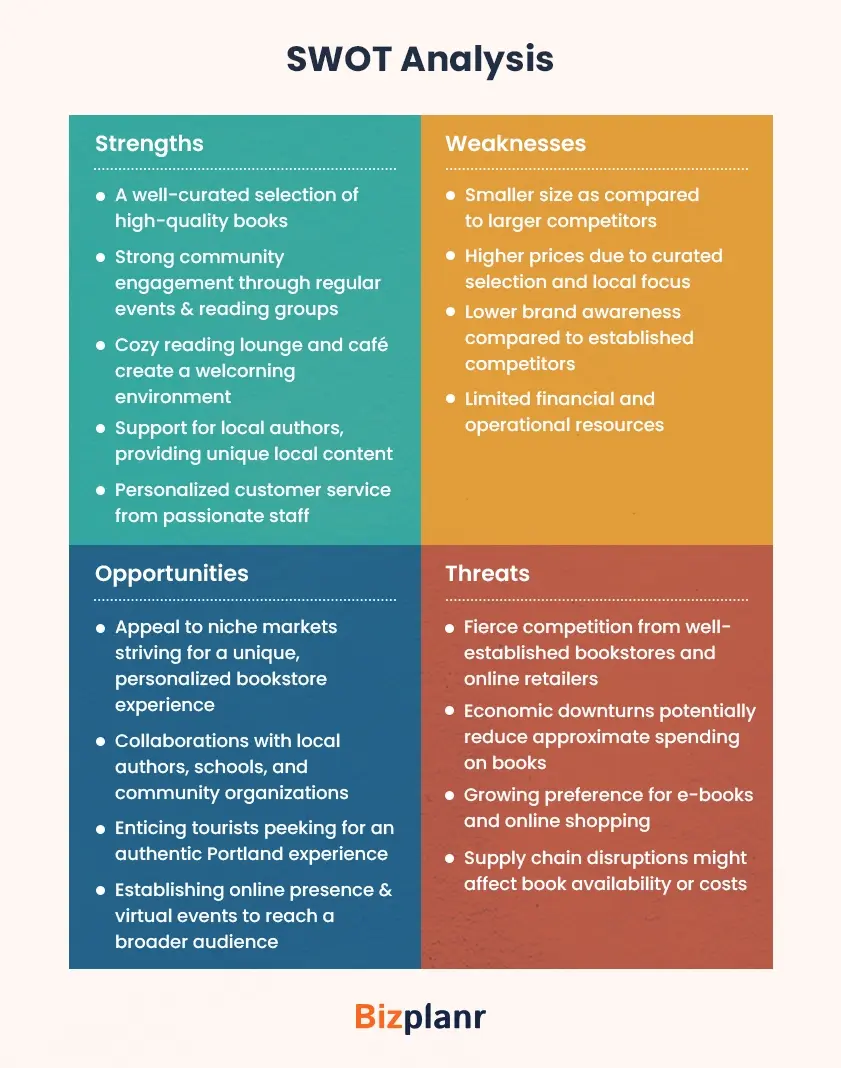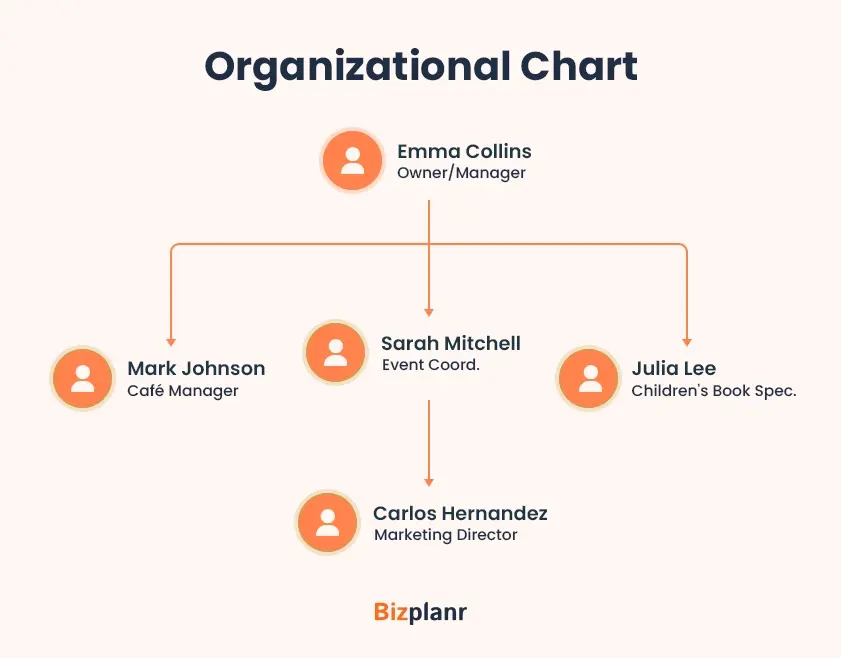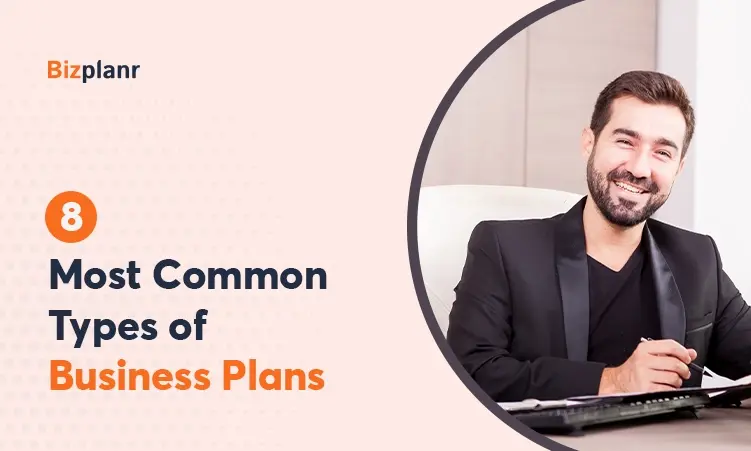As everyone knows independent bookstores are making a remarkable comeback despite being in the digital era.
This is so because people are still craving unique book selections and a personal touch that only a physical bookstore can offer.
So, if you've ever thought of starting your own bookstore, now is the time!
However, you'll need to create an actionable business plan to turn this exciting opportunity into a thriving business venture. It will also help you draw investors's attention and secure bank loans.
Need help preparing your plan?
Not to worry! In this blog post, we’ve illustrated a sample bookstore business plan that you may use as a reference while drafting your own plan.
Sounds good? Let’s get started.
Sample bookstore business plan
Writing a comprehensive business plan will not only help you clarify your business idea and vision but also assist you in navigating the challenges of running a bookstore.
So, let’s explore this bookstore business plan example and get practical information & steps to prepare a professional-looking business plan.
Executive summary
The Reading Haven is a vibrant, independent bookstore, which is located in the heart of Portland, Oregon. Our goal is to create a relaxing, friendly environment for book lovers, where they can escape the hustle and bustle of their routine life, discover new stories, and connect with fellow readers.
We are thrilled to serve the local community through our wide range of books across various genres and an extensive selection of stationery or office supplies that cater to every customer's needs.
At our store, we have a cozy reading lounge and a small café serving tea, and coffee. Moreover, we're all set to nurture a passion for reading and support local writers by hosting regular author events and community reading groups.
Vision statement
We at the Reading Haven have a vision to be the most favorable destination for book lovers in Portland. We also strive to maintain an exceptional selection of books, community engagement, and devoted staff members.
Customer focus
Our target market for the Reading Haven will include avid readers of all ages, local authors, families, and coffee lovers. As we are located within walking distance of the University of Portland, it will bring in college students and staff to the bookstore.
Marketing efforts
Our marketing efforts include social media advertising, an engaging website, in-store promotions, a monthly newsletter, and collaborations with schools, local authors, and libraries.
Our sales strategies involve special events, loyalty programs, and personalized book suggestions. We even ensure our pricing will be competitive with a focus on perceived value.
Success factors
The Reading Haven presents the following success factors in order to survive and expand:
- Our store is strategically located on the busy streets of Portland to attract locals and tourists.
- We offer a diverse and high-quality selection of books that meet various interests and different age groups.
- We aim to host regular events, including author readings, book signings, and book clubs.
- At our store, we provide a relaxing and pleasant environment for enhancing the overall customer experience.
Financial Outlook
At the Reading Haven, we're currently seeking $150,000 in funding. This will help us cover the initial startup costs, such as leasehold improvements, inventory purchases, marketing budget, and working capital for the first quarter operation.
In addition to that, our detailed financial projections illustrate the expected financial performance over the next 3 years:
| Year | Revenue | Expenses | Profit |
|---|---|---|---|
| Year 1 | $250,000 | $200,000 | $50,000 |
| Year 2 | $300,000 | $220,000 | $80,000 |
| Year 3 | $350,000 | $240,000 | $110,000 |
Liking the plan you're reading? It's AI generated.
Generate Your Own Using Bizplanr AI
Company Overview
The Reading Haven is a cozy, community-centric bookstore located at 1234 Maple Street, Suite 200, Portland, OR 97204, USA. It is designed to integrate the traditional charm of an independent bookstore with the modern appeal of a soothing café.
The Reading Haven proposes a curated section of books across different genres, such as fiction, non-fiction, children’s books, and local authors. It also features a calming reading lounge and a small café serving tea, coffee, and snacks.
So, it's not just a place to purchase books; it is a monastery for book lovers of all ages.
Legal structure
Our bookstore—The Reading Haven is registered as an LLC (Limited Liability Company). This kind of structure allows our business to get benefits from the partnership clarity and offers limited liability protection for the business owners.
Mission statement
Our mission is to cultivate a calm and friendly space where readers can unveil new stories, connect with authors, and engage with the community. We even aspire to nurture a love for reading and support local writers by presenting a cheerful, customer-focused atmosphere.
Business owner
Emma Collins is the owner of the Reading Haven. She also serves the responsibilities of the manager. Emma has an expert-level knowledge in literature & business management. This will help us lead the bookstore effectively.
Background information
With a deep passion for literature and a desire to build a unique space, Emma Collins established "The Reading Haven" where book enthusiasts can feel at home.
She got this business idea by realizing the necessity for a community-focused bookstore that not only sells books but also presents a vibrant place for readers. It also allows readers to gather ideas, share their thoughts, and participate in literary events.
The Reading Haven desires to revive the charm and warmth of physical books and in-person interactions, along with the growing trend toward digital media.
Goals and objectives
The Reading Haven aims to establish a loyal customer base through effective marketing, excellent services, and community engagement within the first year. Further, we're looking to reach the break-even point within the first year of operation and develop consistent revenue streams.
Our long-term goal is to expand the store's visibility using strategic partnerships, a strong online presence, and participation in local events. We ensure to achieve the long-term financial health and sustainability of the business with careful financial planning.
Industry analysis
The bookstore market has experienced significant growth in recent years due to a growing appreciation for the personalized experience and community engagement that independent bookstores present.
According to Statista, the revenue of the books market is expected to reach $23.40 billion by 2024 in the United States. Also, it demonstrates a CAGR (2024-2029) of 3.10%, with a projected market volume of $27.26 billion by 2029.
Despite online retailers and e-books dominating the market, many book lovers still value the tangible experience of scanning through physical books and becoming involved in local literary communities.
Moreover, the addition of cafés within bookstores has evolved as a trendy approach that enhances the overall customer experience and provides a unique selling point.
Target market
The Reading Haven's target market comprises of
- Individuals of all ages with a strong passion for reading
- Local authors looking for a supportive platform to sell their works
- Parents & children pursuing quality children’s books
- Coffee aficionados seeking a cozy, literary-themed setting
- Visitors to Portland peeking for a unique, authentic bookstore experience
Key competitors
The Reading Haven faces competition from several key players in our region:
1. Powell's City of Books
Powell's is a well-known independent bookstore, serving Portland, Oregon, since 1971. It offers a diverse selection of used books and new volumes, as well as gifts for bibliophiles.
Strengths:
- Extensive selection of books of multiple genres
- Strong brand presence
- Large store with a wide range of merchandise products
Weaknesses:
- Not suitable for customers seeking a more intimate shopping experience
- Less personalized service due to the scale of operations
- Lacks the community-focused atmosphere
2. ADLE International
ADLE International is an independent bookstore dedicated toward the mission of affordability and education for limited-income earners.
Strengths:
- Specializes in rare and out-of-print books
- Unique checklist that cannot be easily found elsewhere
- Strong focus on a specific market segment
Weaknesses:
- Limited range of genres and categories
- Smaller customer base due to the niche focus
- Not presenting any community events
3. Lloyd Center
It's a shopping mall along with different retail options, including bookstores.
Strengths:
- High foot traffic and accessibility
- Attracts broad audience
- Set a presence with a various type of stores
Weaknesses:
- Lacks the specialized and cozy environment
- Less emphasis on personalized service
- Not focused exclusively on books
SWOT analysis
Products or service offerings
The Reading Haven is going to retail a wide range of books, stationery items, and literary-themed gifts. We will also consider selling the following products at our bookstore:
- Fiction & non-fiction book selection
- Children’s books
- Local (Portland and Oregon-based) authors' books
- Specialty publications
- Journals and notebooks
- Various designs & bookmarks
As well as we offer a relaxing environment for customers to enjoy while reading or socializing. Our café offerings include beverages, snacks, and light meals.
Furthermore, we are planning to host a variety of events, such as author readings, book signings, book clubs, writing workshops, etc. This will help us build community engagement and support local authors.
Unique selling points
At the Reading Haven, we have a well-curated book selection that ensures quality and relevance to our customer's interests. We also regularly organize events and book clubs to develop a passionate literary community and uplift ongoing customer engagement.
Furthermore, we've hired a knowledgeable staff that provides personalized book recommendations and builds a friendly, approachable atmosphere.
Operations plan
The Reading Haven operates seven days a week, from 9:00 AM to 8:00 PM on weekdays and 10:00 AM to 6:00 PM on weekends. Here, we've described the daily operations that our business performs to serve our customers:
Staff training
We train our staff to effectively assess the security protocols, such as controlling shoplifting incidents, handling cash, and responding to any crises. Also, we conduct regular meetings to keep our staff informed and prepared.
Inventory management
We've partnered with respectable book distributors, local authors, and publishers to develop strong relationships and regular deliveries. This will help us ensure a steady flow of inventory. By tracking stock levels, we can even manage orders and monitor sales trends.
Maintenance and cleanliness
We regularly maintain high standards of cleanliness throughout the store and café. Also, we schedule frequent checks and repairs for the store’s interior and exterior, as well as ensure everyday cleaning routines are followed.
Technology & systems
At our bookstore, we will implement a robust POS system to manage transactions, an inventory management system to keep track of stock levels, and CRM software to handle all the customer information.
Your operations plan must be clear, well-written, and practical enough. So, ensure that you regularly review and update it as your business grows.
Organization and management
Emma Collins, Owner and Manager
Emma takes care of the overall management of the Reading Haven, including strategic planning, financial management, inventory selection, and staff supervision.
Background: Emma has a Bachelor's degree in English Literature and an MBA. With over 10 years of experience in the book retail industry, she managed a local independent bookstore.
Mark Johnson, Café Manager
Mark oversees the day-to-day operations of the café and handles the menu planning, supply control, and customer service.
Background: With over 8 years of experience, Mark has a strong expertise in hospitality management. Also, he has worked in various cafés and restaurants.
Sarah Mitchell, Event Coordinator
Sarah is responsible for planning and executing all the in-store events, such as book signings, book clubs, and author reading. She also coordinates with local authors and community groups.
Background: Sarah holds a Master's degree in Event Management. Likewise, she has 6 years of experience in organizing community events and literary gatherings.
Julia Lee, Children's Book Specialist
Julia has a role in maintaining the children's book selection. She even organizes children's events and reading groups, as well as advises parents and young readers.
Background: Julia has a degree in Early Childhood Education and plenty of experience in children's literature.
Carlos Hernandez, Marketing Director
Carlos specializes in developing and implementing marketing strategies. He also operates social media accounts, builds promotional materials, and improves the bookstore's online presence.
Background: Carlos has a Bachelor's degree in Marketing. Also, he has significant experience in digital marketing and brand management.
Sales and marketing strategies
As there are 43,688 bookstores in the United States, we'll need to captivate the hearts of book lovers through multiple strategies, including traditional & digital approaches.
At the Reading Haven, we have the following some of the promotional plans to attract and retain customers in the competitive marketplace.
Online marketing plan
The Reading Haven will develop a user-friendly website, use social media channels (Instagram, Facebook, and Twitter), send out a monthly newsletter to subscribers, and collaborate with local influencers and bloggers. This will allow us to engage with customers, advertise new arrivals, and promote events.
Offline marketing plan
We will also use offline marketing strategies to promote our business. It includes regular in-store promotions, loyalty programs, member discounts, flyers & posters distributions. We also host special events and workshops as well as partner with local schools, libraries, and community organizations.
Sales strategy
We will offer a membership program with a few benefits, create bundled offers that pair books with related merchandise or cafe items, and implement customer loyalty programs where they gain points for every purchase. We will also execute special promotions during holidays and local events. This will increase our sales and enhance customer experience.
Pricing strategy
The Reading Haven ensures that the prices are competitive with other bookstores and online retailers while reflecting the quality of the selection. We also offer premium rates for limited editions, signed copies, and rare finds. Even, we present sales events and regular discounts to draw budget-friendly patrons and move older inventory.
Funding request
Starting and growing the Reading Haven requires a significant amount of capital. Here, we've listed our financing requirements:
Amount of funds required
The Reading Haven aims to secure $150,000 in funding. The funding amount will be dedicated to cover the initial startup costs and ensure smooth business operations during the first six months.
Use of funds
| Category | Amount |
|---|---|
| Leasehold Improvements | $50,000 |
| Inventory Purchases | $40,000 |
| Cafe Equipment | $20,000 |
| Marketing | $15,000 |
| Working Capital | $25,000 |
| Total | $150,000 |
Financial projections
The financial projections for Reading Haven will demonstrate a positive forecast of revenue growth, manageable expenses, and increasing profitability over the first 3 years of operation.
Key revenues
| Revenue Projections | Year 1 | Year 2 | Year 3 |
|---|---|---|---|
| Book Sales | $150,000 | $180,000 | $210,000 |
| Café Sales | $50,000 | $60,000 | $70,000 |
| Merchandise Sales | $30,000 | $40,000 | $50,000 |
| Event Income | $20,000 | $20,000 | $20,000 |
| Total Revenue | $250,000 | $300,000 | $350,000 |
Expense projections
| Expense Projections | Year 1 | Year 2 | Year 3 |
|---|---|---|---|
| Cost of Goods Sold (COGS) | $100,000 | $120,000 | $140,000 |
| Salaries and Wages | $50,000 | $55,000 | $60,000 |
| Rent | $30,000 | $30,000 | $30,000 |
| Utilities | $10,000 | $11,000 | $12,000 |
| Marketing | $15,000 | $20,000 | $25,000 |
| Café Supplies | $10,000 | $12,000 | $14,000 |
| Miscellaneous Expenses | $5,000 | $7,000 | $9,000 |
| Total Expenses | $220,000 | $255,000 | $290,000 |
Profitability
| Profit Projections | Year 1 | Year 2 | Year 3 |
|---|---|---|---|
| Total Revenue | $250,000 | $300,000 | $350,000 |
| Total Expenses | $220,000 | $255,000 | $290,000 |
| Net Profit | $30,000 | $45,000 | $60,000 |
Cash flow statement
The Reading Haven's cash flow statement reflects the inflows and outflows of cash. This will ensure that our store keeps sufficient liquidity to cover its operating expenses and any unexpected costs.
| Cash Flow Statement | Year 1 | Year 2 | Year 3 |
|---|---|---|---|
| Cash Inflows | |||
| Sales Revenue | $250,000 | $300,000 | $350,000 |
| Owner's Investment | $150,000 | - | - |
| Total Cash Inflows | $400,000 | $300,000 | $350,000 |
| Cash Outflows | |||
| Leasehold Improvements | $50,000 | - | - |
| Inventory Purchases | $40,000 | $45,000 | $50,000 |
| Café Equipment | $20,000 | $5,000 | $5,000 |
| Salaries and Wages | $50,000 | $55,000 | $60,000 |
| Rent | $30,000 | $30,000 | $30,000 |
| Utilities | $10,000 | $11,000 | $12,000 |
| Marketing | $15,000 | $20,000 | $25,000 |
| Café Supplies | $10,000 | $12,000 | $14,000 |
| Miscellaneous Expenses | $5,000 | $7,000 | $9,000 |
| Working Capital | $25,000 | - | - |
| Total Cash Outflows | $255,000 | $185,000 | $205,000 |
| Net Cash Flow | $145,000 | $115,000 | $145,000 |
Income statement
Our income statement (profit & loss statement) describes the revenues, expenses, and net income, as well as provides a clear snapshot of the store's financial performance.
| Income Statement | Year 1 | Year 2 | Year 3 |
|---|---|---|---|
| Revenues | |||
| Book Sales | $150,000 | $180,000 | $210,000 |
| Café Sales | $50,000 | $60,000 | $70,000 |
| Merchandise Sales | $30,000 | $40,000 | $50,000 |
| Event Income | $20,000 | $20,000 | $20,000 |
| Total Revenues | $250,000 | $300,000 | $350,000 |
| Cost of Goods Sold (COGS) | |||
| Books | $70,000 | $84,000 | $98,000 |
| Café Supplies | $20,000 | $24,000 | $28,000 |
| Merchandise | $10,000 | $12,000 | $14,000 |
| Total COGS | $100,000 | $120,000 | $140,000 |
| Gross Profit | $150,000 | $180,000 | $210,000 |
| Operating Expenses | |||
| Salaries and Wages | $50,000 | $55,000 | $60,000 |
| Rent | $30,000 | $30,000 | $30,000 |
| Utilities | $10,000 | $11,000 | $12,000 |
| Marketing | $15,000 | $20,000 | $25,000 |
| Miscellaneous Expenses | $5,000 | $7,000 | $9,000 |
| Total Operating Expenses | $110,000 | $123,000 | $136,000 |
| Net Income | $40,000 | $57,000 | $74,000 |
Balance sheet
The Reading Haven's balance sheet will give an exact idea of its financial position (including assets, liabilities, and equity).
| Balance Sheet | Year 1 | Year 2 | Year 3 |
|---|---|---|---|
| Assets | |||
| Current Assets | $150,000 | $180,000 | $210,000 |
| Cash and Cash Equivalents | $45,000 | $55,000 | $65,000 |
| Accounts Receivable | $5,000 | $10,000 | $15,000 |
| Inventory | $100,000 | $115,000 | $130,000 |
| Fixed Assets | |||
| Property, Plant, and Equipment | $50,000 | $55,000 | $60,000 |
| Total Assets | $200,000 | $235,000 | $270,000 |
| Liabilities | |||
| Current Liabilities | $50,000 | $50,000 | $50,000 |
| Accounts Payable | $20,000 | $25,000 | $30,000 |
| Short-term Loans | $30,000 | $25,000 | $20,000 |
| Long-term Liabilities | |||
| Long-term Loans | $50,000 | $45,000 | $40,000 |
| Total Liabilities | $100,000 | $95,000 | $90,000 |
| Equity | |||
| Owner's Equity | $100,000 | $140,000 | $180,000 |
| Total Equity | $100,000 | $140,000 | $180,000 |
Break-even analysis
For the Reading Haven, we have performed a break-even analysis that specifies the fixed & variable costs, as well as the sales price per unit.
| Description | Amount |
|---|---|
| Fixed Costs (TFC) | |
| Salaries and Wages | $50,000 |
| Rent | $30,000 |
| Utilities | $10,000 |
| Marketing | $15,000 |
| Miscellaneous Expenses | $5,000 |
| Total Fixed Costs (TFC) | $110,000 |
| Variable Costs (TVC) | |
| Books | $70,000 |
| Café Supplies | $20,000 |
| Merchandise | $10,000 |
| Total Variable Costs (TVC) | $100,000 |
| Total Revenue | |
| Total Revenue | $250,000 |
| Break-Even Analysis | |
| Number of Units Sold | 10,000 |
| Variable Cost per Unit (VCU) | $10 |
| Sales Price per Unit (SPU) | $25 |
| Contribution Margin (CM) per Unit | $15 |
| Break-Even Point | |
| Units | 7,333 units |
| Revenue | $183,325 |
Download a bookstore business plan template
So, are you ready to start drafting your bookstore business plan? But need help with that? Look no further; download our free bookstore business plan template PDF and get started now.
This investor-friendly business plan template provides you with easy-to-follow instructions and examples that help you create a solid business plan effortlessly. You can even revise it as per your specific needs.
Conclusion
Now, with this sample business plan, you've got a clear idea of writing a comprehensive yet effective business plan for your bookstore.
If you're still confused or find it challenging to draft a detailed business plan from scratch, you may consider using an AI business plan generator. It will help you create a business plan more effectively and quickly.
You'll have to simply answer a few queries and it will generate your plan in minutes!
Get Your Business Plan Ready In Minutes
Answer a few questions, and AI will generate a detailed business plan.
Frequently Asked Questions
How do I secure funding for my bookstore?
To secure funding for your bookstore, first you'll need to create a comprehensive business plan that includes all the key aspects of your business. Further, you have to identify potential funding sources like small business loans, angel investors, crowdfunding, or government grants.
In addition to that, you should consider networking with industry experts and attending relevant events to connect with potential investors.
What are the key financial projections I should include in my business plan?
You should consider including the following key financial projections in your plan that every potential investor needs to know:
- Profit and loss statement
- Balance sheets
- Cash flow projections
- Sales and revenue forecasts
- Break-even analysis
- Funding requirements
- Tax considerations
How can I make my bookstore business plan stand out to investors?
Consider following the below key strategies to make your bookstore business plan stand out to investors:
- Summarize your unique value proposition that differentiates your store from the others.
- Highlight your market research and showcase an in-depth understanding of your target customers and their needs.
- Create a detailed financial plan that illustrates your realistic financial projections.
Include visual elements (like charts or infographics) to make your plan visually appealing and enhance readability.
What key elements should I include in the executive summary?
Here’s the list of key elements that you should include in your executive summary:
- Business idea and goals
- Mission-vision statements
- Target market overview
- Unique Selling Proposition (USP)
- Promotional strategies
- Financial highlights
